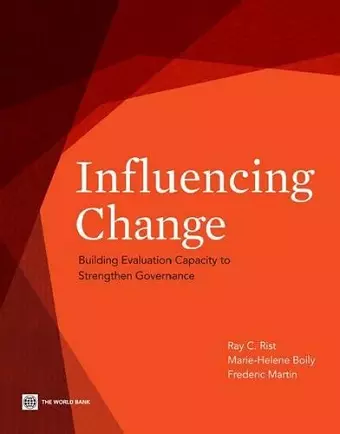Influencing Change
Evaluation and Capacity Building
Ray C Rist author Frederic Martin author Marie-Helene Boily author
Format:Paperback
Publisher:World Bank Publications
Published:28th Mar '11
Currently unavailable, and unfortunately no date known when it will be back

In the first section of this book, four chapters explore how evaluation can influence and interact with the change process in policy and institutional development. Wijayatilake recalls a convincing and riveting story about how evaluation was introduced in Sri-Lanka and what kind of striking results could be achieved in a few years through a progressive pragmatic approach and strong leadership. Wiesner reviews the role of evaluation in the formation of macroeconomic policy in Latin America and outlines the role of demand for improved results and performance and of the accountability from the politicians, the private sector and civil society and, in the end, the population. Dimitrov proposes a 7 step approach for tacking institutional Performance evaluation and applies it to the case of the Black Sea Trade and Development Bank. Jaljouli addresses the challenge of the integration of development strategy and the evaluation process and uses Dubai as a case study. In the second section of this book, five chapters present a variety of lessons learnt and good practices in Evaluation Capacity Building (ECB). Heider presents a structured approach to capacity development working at three levels: individual training, institutional development, and an enabling environment and suggests moving from capacities to capabilities. Agrawal and Rao identify various factions influencing the use of evaluation results and show in the case of India how capacity building was used to increase this use. Andriantseheno addresses how an M and E system for a major development program can be set up as part of a programmatic approach using the case study of the Environment/Rural Development and Food Security program in Madagascar. Porter outlines the potential of the helping approaches an evaluation capacity development strategy and uses the Bana Barona/Abantwanu Bethu project in South Africa to prove his point. Clotteau et al. review major challenges in ECB and present a variety of ECB strategies to design and implement Results-Based National M and E systems, building upon a number of experiences in Africa, Asia, and Latin America. The third section of the book discusses new perspectives on ECB. Picciotto outlines a path for the future of development evaluation on the basis of a review of emerging endogenous and exogenous trends. By surveying recent theoretical developments in ECB, Nielsen and Attström map the...
ISBN: 9780821384039
Dimensions: unknown
Weight: unknown
248 pages